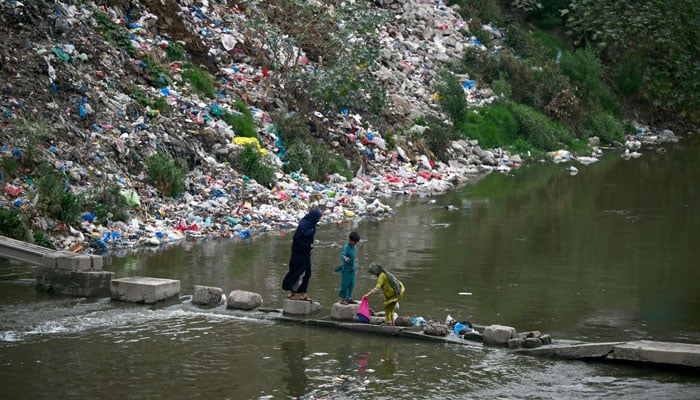Economy vs ecology
To feed growing population, humans began cultivating vast areas of land to produce various crops
Economy and ecology are interrelated and interdependent terms. Simply put, the economy involves the management of resources, while ecology focuses on the study of the environment.
Growth or decline in one area affects the other. The environment became a focal point when unsustainable national growth and the race to exploit maximum resources led to the depletion of natural resources and adverse effects on our surroundings.
We first examine the role of unchecked economic growth in creating environmental problems or finding solutions. Population growth demands more food, shelter, employment, and education facilities. To meet these shelter and economic needs, humans began clearing forests to build housing colonies and skyscrapers to accommodate the growing population.
Similarly, to feed a growing population, humans began cultivating vast areas of land to produce various crops. The next stage of technological advancement and the pursuit of economic growth led to industrialization and the introduction of modern transportation methods such as railways, aircraft, and ships to expedite export and import processes.
In this pursuit of economic growth, we started to destroy our environment. The elimination of forest cover negatively impacted our environment in two significant ways. First, forest cover acts as a natural carbon sink. A significant reduction in forest cover led to an increase in carbon emissions in the atmosphere, causing global warming and climate change. According to the UN Environment Program, “Currently, 11 per cent of all carbon emissions stem from deforestation – more than emissions from all means of transport combined.” Similarly, another important cause of climate change and global warming is the unchecked use of fossil fuels in the process of industrialization.
According to NASA Earth Observatory, emissions from fossil fuels rose by 1.1 per cent in 2023 compared to 2022 levels. Additionally, “transport accounts for nearly one-quarter of global energy-related carbon dioxide emissions,” according to UN reports.
Another consequence of the elimination of forest cover on ecology is the loss of habitat for many precious species. The extinction of one species leads to the disruption of the natural food chain, threatening the existence of many other animal species. Moreover, the loss of habitat forces many animals to find shelter in human settlements, causing the spread of many zoonotic diseases. This also generates health crises along with environmental challenges.
On the other hand, economic growth and technological advancements are helping to find some solutions to these ecological problems. For example, AI can help quantify the exact amounts of carbon emissions from a source. Similarly, geo-sensing can help map deforestation areas and monitor illegal logging.
Agricultural scientists have developed mechanisms through biotechnology to increase crop yields and grow climate-resilient crops. Early warning systems can predict weather patterns to help people adapt their lifestyles and avoid significant losses. However, all these technological achievements are aimed at fixing the problems created by mankind’s economic race.
Ecological conditions can have impacts on the economy as well. When we clear forest cover, it also snatches a source of income from many people. Furniture and herbal medicines are important markets that require wood and herbs from forests. Many climate-led disasters like floods, heatwaves, and droughts disrupt economic activities.
According to the Finance Division of Pakistan, The damage is estimated at $14.9 billion, the loss to the GDP at $15.2 billion, and the total need for rehabilitation at $16.3 billion. In addition to this, indirect economic losses are also in huge numbers. Floods bring many waterborne diseases and cause huge spending on treatments and medicines.
So, the savings of the poor are spent to deal with health challenges caused by climate-led disasters. Due to health challenges, their economic output also remains low to support their families. As a result, they are stuck in a poverty trap. Poor people put their efforts into educating their children to change their destinies.
As a result of floods and other disasters, affected populations or displaced populations cannot afford to send their children to schools, negatively impacting financial conditions in the long term. Such disasters also negatively impact the overall economic conditions of developing and poor nations as well.
Developing countries already struggling for financial stability are shaken by such kinds of disasters. They are forced to spend their finances on rehabilitation and relief efforts in the aftermath of such kinds of disasters. So, the funds allocated for development projects and poverty alleviation schemes are spent in emergencies caused by environmental and climate-led disasters.
On the other hand, if environmental conditions are healthy and sustainable, they can also help flourish economic conditions at individual and national levels.
The writer is a graduate of the University of Oxford in Public Policy. She tweets/posts @zilehumma_1 and can be reached at: zilehuma_1@hotmail.com
-
 Chris Hemsworth Gets Candid About Daughter’s Drawings That Inspired Several Of His Tattoos
Chris Hemsworth Gets Candid About Daughter’s Drawings That Inspired Several Of His Tattoos -
 UK To Experience Rare 'Blood Rain' On Tuesday Feb. 24, 2026: Know Every Detail
UK To Experience Rare 'Blood Rain' On Tuesday Feb. 24, 2026: Know Every Detail -
 Maria Shriver Shares Heartbreaking Reminder After Eric Dane's Death: 'Next Week Isn't Guaranteed'
Maria Shriver Shares Heartbreaking Reminder After Eric Dane's Death: 'Next Week Isn't Guaranteed' -
 Andrew Mountbatten Windsor Gets New Moniker After Losing ‘Prince’ Title
Andrew Mountbatten Windsor Gets New Moniker After Losing ‘Prince’ Title -
 Jack Black Shares Unseen Moments With Tanya Haden: 'My Love'
Jack Black Shares Unseen Moments With Tanya Haden: 'My Love' -
 Shamed Andrew Made Taxpayers Fund Personal ‘massages’
Shamed Andrew Made Taxpayers Fund Personal ‘massages’ -
 What Could Be Nick Reiner's Fate After Pleading Not Guilty Parents’ Murder Case?
What Could Be Nick Reiner's Fate After Pleading Not Guilty Parents’ Murder Case? -
 Princess Kate Talks About 'hard Conversations' With Kids Amid Andrew Drama
Princess Kate Talks About 'hard Conversations' With Kids Amid Andrew Drama -
 Prince William Mocked For Being ‘most Reluctant’ King-in-waiting
Prince William Mocked For Being ‘most Reluctant’ King-in-waiting -
 Prince William Makes Rare Admission After Andrew Arrest
Prince William Makes Rare Admission After Andrew Arrest -
 ‘Got A Lot Of People Gunning For Me’: Trump Makes First Comments On Mar-a-Lago Intruder
‘Got A Lot Of People Gunning For Me’: Trump Makes First Comments On Mar-a-Lago Intruder -
 What Countries Have A Say In Andrew Removal From Line Of Succession?
What Countries Have A Say In Andrew Removal From Line Of Succession? -
 How Did Luci4 Die? Police Probes 'BodyPartz' Sudden 'suspicious' Death
How Did Luci4 Die? Police Probes 'BodyPartz' Sudden 'suspicious' Death -
 King Charles Criticized By Princess Anne Over Andrew Drama
King Charles Criticized By Princess Anne Over Andrew Drama -
 Kelly Osbourne Hits Back At 'absolutely Devastating' Body Shaming Comments
Kelly Osbourne Hits Back At 'absolutely Devastating' Body Shaming Comments -
 Hailee Steinfeld Details Preparations Ahead Of Welcoming First Kid With Josh Allen
Hailee Steinfeld Details Preparations Ahead Of Welcoming First Kid With Josh Allen




